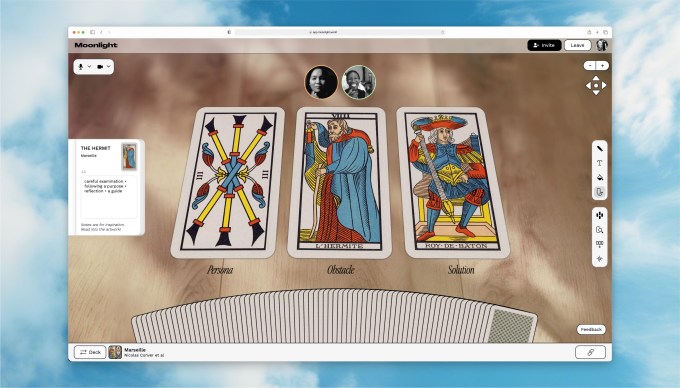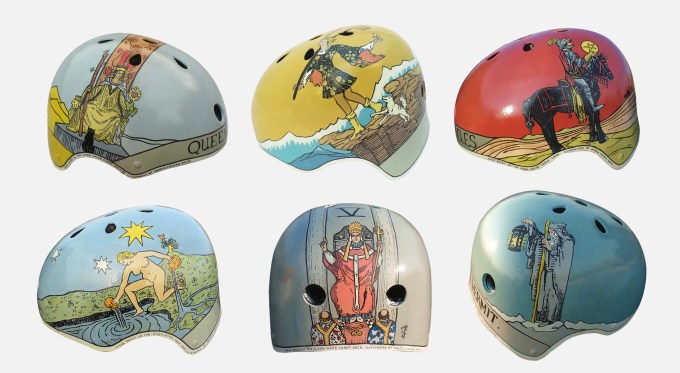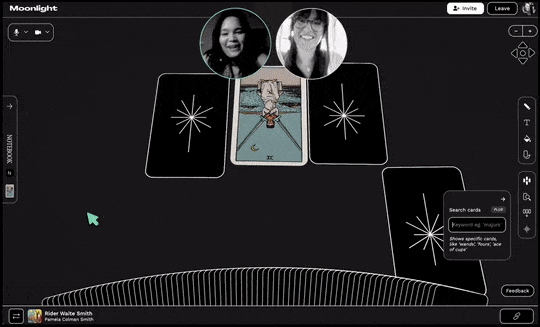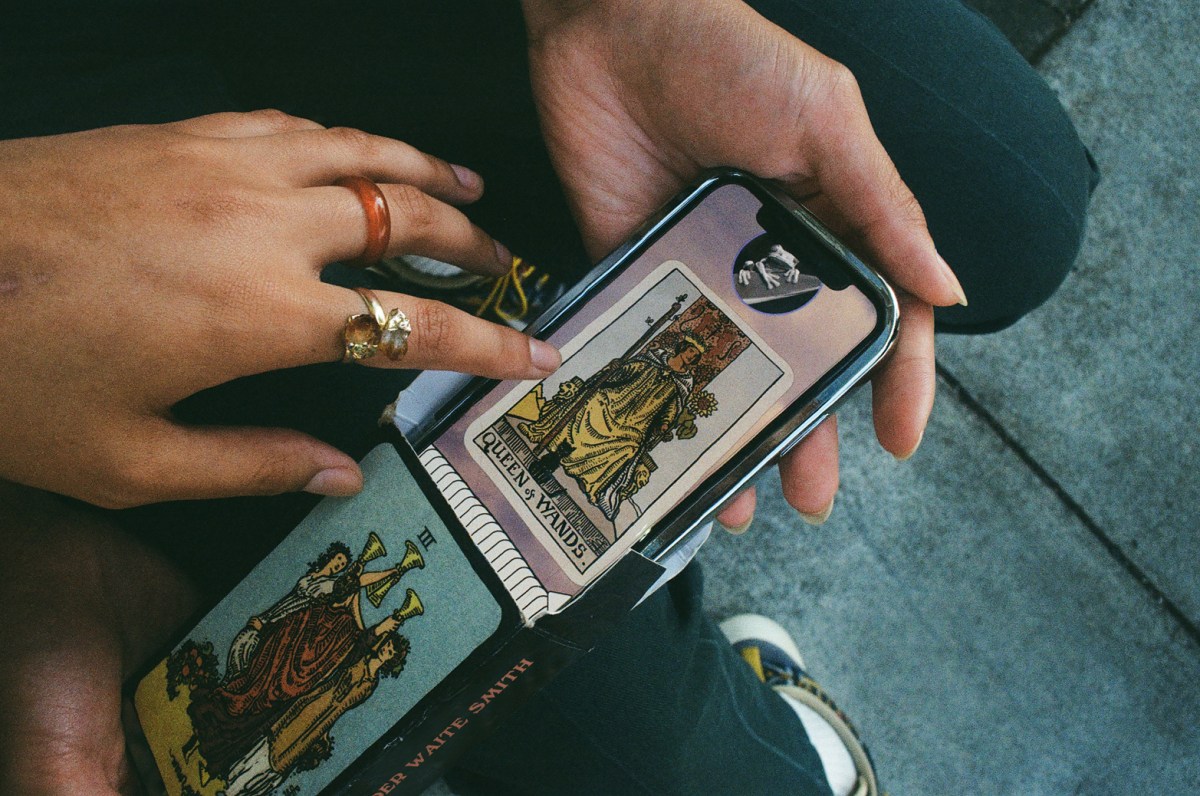Bay Area artist Danielle Baskin is not a first-time founder – but this is the first time she’s started a tech company that isn’t a performance art piece, or an elaborate joke. Still, she has a tongue-in-cheek tagline to pitch her latest venture: “It’s SaaS for witches.”
She’s not kidding. Moonlight is a free online tarot platform, where you can draw tarot cards on your own, do a reading in a multiplayer room, or even book a session with a vetted tarot professional (that’s where the SaaS part comes in).
Some founders would kill to have just one good idea. Baskin has so many good ideas that some of her performance art projects have inadvertently spun into legitimate companies. What if instead of getting more corporate swag, you could go to a conference and get a Salesforce-branded avocado? (“That was actually a solid business,” she told TechCrunch, but it was quashed by the pandemic).
She’s also spent four years running Dialup, an app that pairs strangers in one-on-one phone calls. Then, there are less time-consuming joke products like OneHoodie, a hoodie with swappable velcro logos, in case your company gets acquired and you don’t want a whole new hoodie; Drone Sweaters, clothes to keep your drone warm; or Warby Parkour, photos of glasses doing parkour. Some of the funding for Moonlight came from selling her business Maskalike, where she made photorealistic face masks with people’s actual faces on them.
“After I sold my mask company, I felt like for the first time in my life, I wasn’t hustling anything, and I could just think about what I wanted to do next,” she said. Then came Moonlight.

Image Credits: Moonlight
Moonlight has an appropriately mystical connection to one of Baskin’s first companies. About fifteen years ago, Baskin ran a business painting custom bike helmets, but around the same time, she had just begun learning about tarot.
Tarot isn’t fortune-telling or psychic reading. Dating back to the 1400s, each of the 78 cards in the tarot deck tells a story. Tarot readers help people interpret the cards they pull, and draw from the stories of the cards to help clients think through life events from a different angle.
“I had this idea to paint each tarot card on 78 unique helmets, and sell them all in New York, so that they’d all be shuffling around, and when you pass a cyclist, you could get a reading on your bike,” she said. “You’d be biking and pass the three of swords and you’re like, ‘Oh, I’m going to think about heartbreak right now,’ or you pass the magician, and you’re like, ‘Oh, I should be doing more spectacles today.’”
Sometimes, she’d trade a helmet for a few tarot lessons with a witch (which is how some tarot practitioners describe themselves). It was at one of these lessons that Baskin first imagined what an online tarot platform could look like.

Image Credits: Danielle Baskin/Inkwell Helmets
“One of my teachers, I went to her place and she had this desktop computer in the corner, and there were these beach sounds coming from it,” she said. “I asked her what was on her computer, and she explained that she was a tarot reader in Second Life [at a beachside tarot shop]. She would meet clients there, and people all over the world would voice chat with her… That’s always been in the back of my mind. Even when building this, I’m like, ‘Whoa, should I get in touch with her again?’”
Baskin has spent fifteen years of studying tarot, giving readings (sometimes at corporate parties), and getting to know other witches. Now, the path to Moonlight has come full circle.
Moonlight’s interface is beautiful and intuitive. When you enter a room, you start by shuffling your tarot deck – the default is the iconic Rider Waite Smith deck, but decks from other artists are for sale. You can pull cards in four different preset spreads, but you can also just pull cards onto a blank canvas, which can be helpful for people learning to read the cards. If you’re not a tarot expert, there’s a built-in handbook inside the app, but the descriptions are pretty open-ended – “I just put in the most minimalist keywords, so you could project your own meanings onto it,” Baskin said.
As she was building out the idea for Moonlight, Baskin teamed up with Caroline Hermans, a game designer and former UX engineer at Google.
“It took a whole two years before I actually made it, because I was also like, who can I collaborate with? Are there tarot engineers?” Baskin said. Hermans fit the bill.

Image Credits: Moonlight
Moonlight was first bootstrapped with the money Baskin made selling Maskalike, but she managed to find some angel investors to jump in as well (she declined to say how much she’s raised). Given her history of poking fun at Silicon Valley – she sold blonde wigs and “blood energy drinks” outside of the courtroom at Elizabeth Holmes’ trial, and she was behind the TouchBase trading cards, which treated venture capitalists like baseball players – she wasn’t sure if investors would take her seriously.
“I was worried that investors might think I’m a prankster – will that hurt me in actually making a business? But I think if people actually know me, they know I’m multi-faceted,” she said. “A lot of investors I met with were familiar with my artwork. They’re like ‘Oh, you did BART Basel,’ the art show in BART.”
It’s important to Baskin that Moonlight has an actual business plan from the get-go – she learned that lesson while running Dialup, which has since been sunsetted.
“I was in this sort of mindset, maybe similar to Clubhouse, where I was like, ‘Well, we can keep growing our app, and keep it free, and then as it’s more popular, we’ll figure out a plan to monetize it,’” she said. Neither Clubhouse nor Dialup thrived under that model – most companies don’t. But Moonlight already is generating some income by taking a 15% platform fee from bookings with tarot readers and sales of digital decks. The platform launched without fanfare about a year ago, but now that its booking flow is in place, Moonlight is looking to make a splash.
“I was worried that witches would hate technology. You know, they’re like, ‘My physical deck is charged with a crystal in the windowsill and that’s the only one I’ll use,’ but no, everyone’s on the internet,” Baskin said. “Witches have Instagram. We’re all using technology, and I think they’re excited that someone’s making a platform who’s a tarot person, too.”

